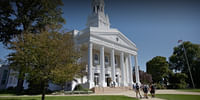Political scientists ask questions about the meaning of power, how power is gained or lost, organized or contested, used or abused.
Our courses explore a wide range of issues about politics including:
- the concepts and norms central to power and politics (e.g., authority, domination, gender, freedom);
- the structure and operations of law and institutions (e.g., the U.S. Supreme Court, United Nations, non-citizen organizations);
- the influence of politics on economics and vice versa;
- the historical, sociological and cultural factors involved in political development; social movements and processes (e.g., revolution, women's movements, immigration);
- comparative political systems (e.g., democracy, communism); political trends and transformations in various regions (e.g. Africa, East Asia, South Asia, Latin America);
- interactions among countries, international organizations, ngos, and other non-state actors in the global system;
- and analyses of current affairs in the many realms and contexts in which politics take place.
Our curriculum is specifically designed to achieve several goals:
- Provide majors with a broad background in the discipline of political science through the study of the four subfields that comprise it: American politics and law, comparative politics, international relations and political theory.
- Help students develop the capacity to think critically about themselves and local, national, and global politics.
- Train students to become informed and reflective citizens of their countries, as well as knowledgeable about the global dynamics that influence the shape and content of political life.
- Facilitate the acquisition of particular skills and tools, including the ability to read complex texts closely; write clearly and well; think critically and analytically; generate and test hypotheses; and take and defend a position against the strongest counterarguments.












